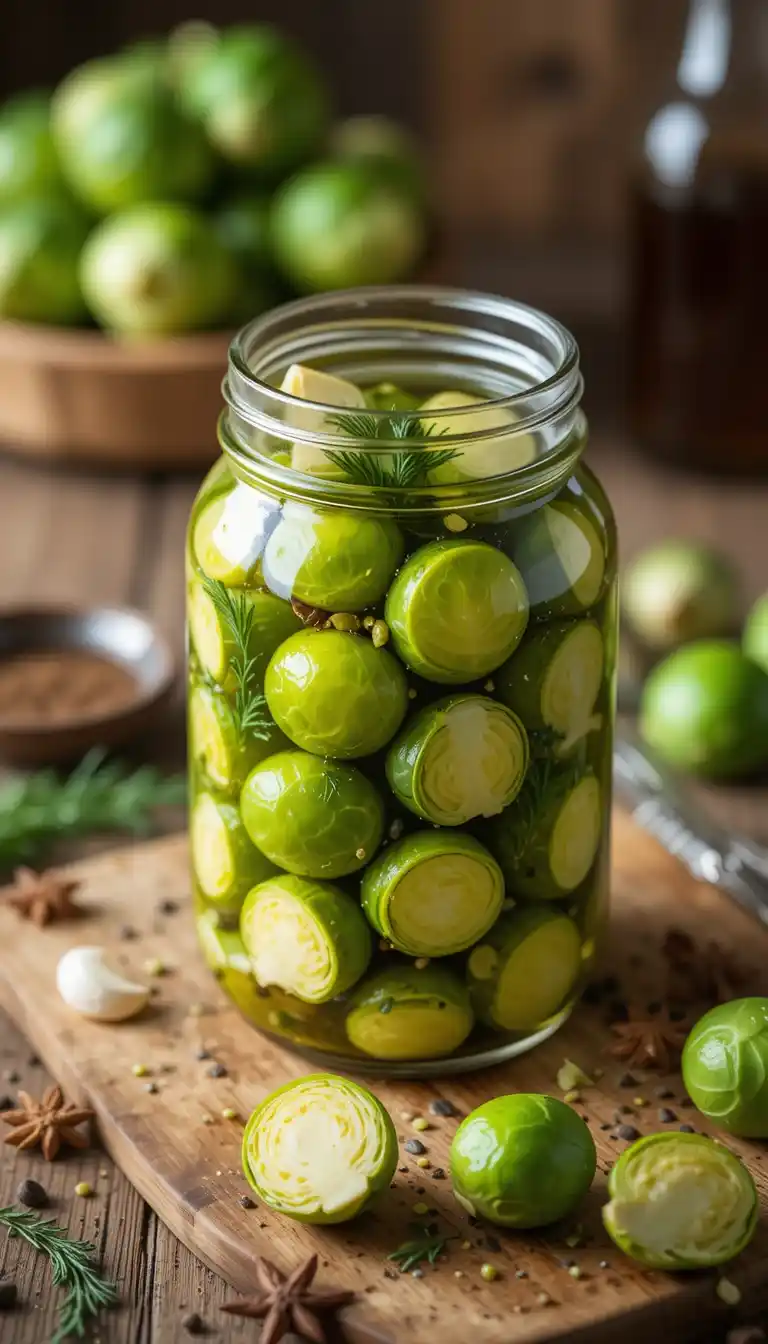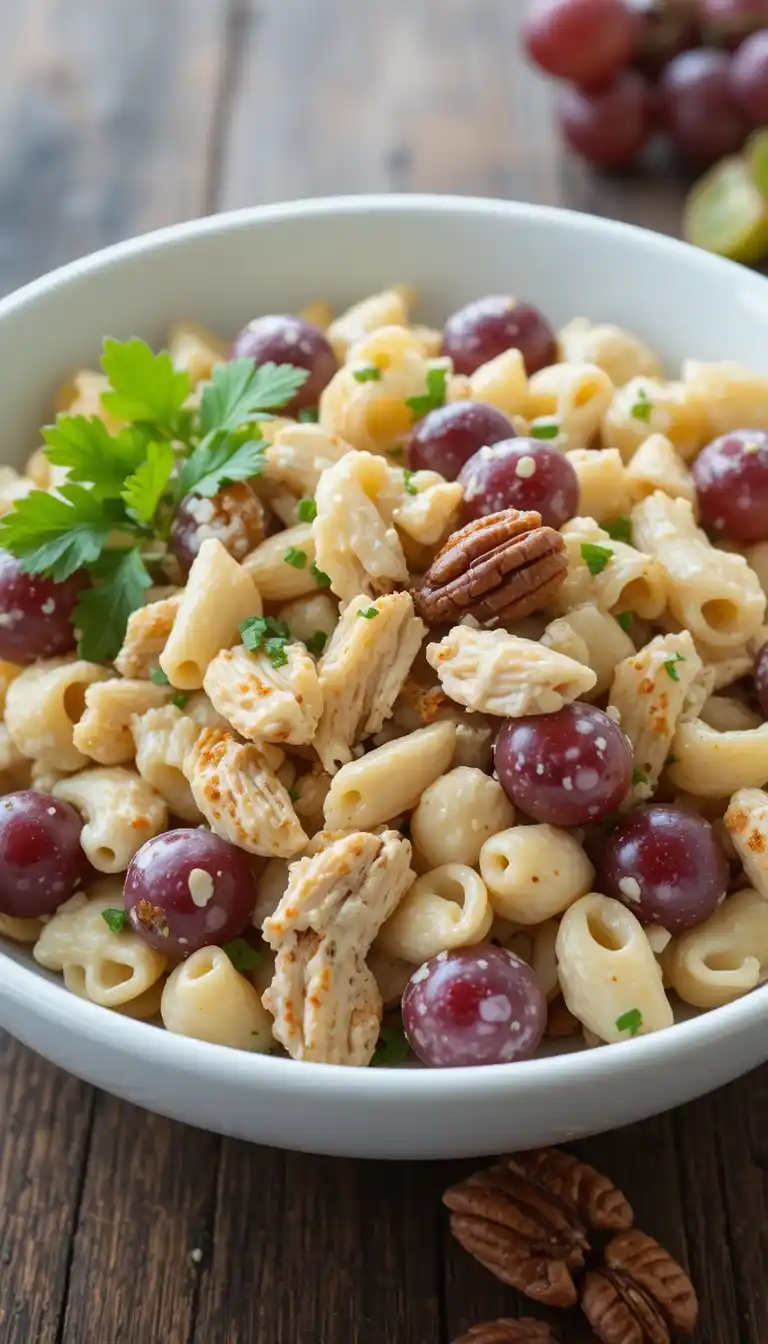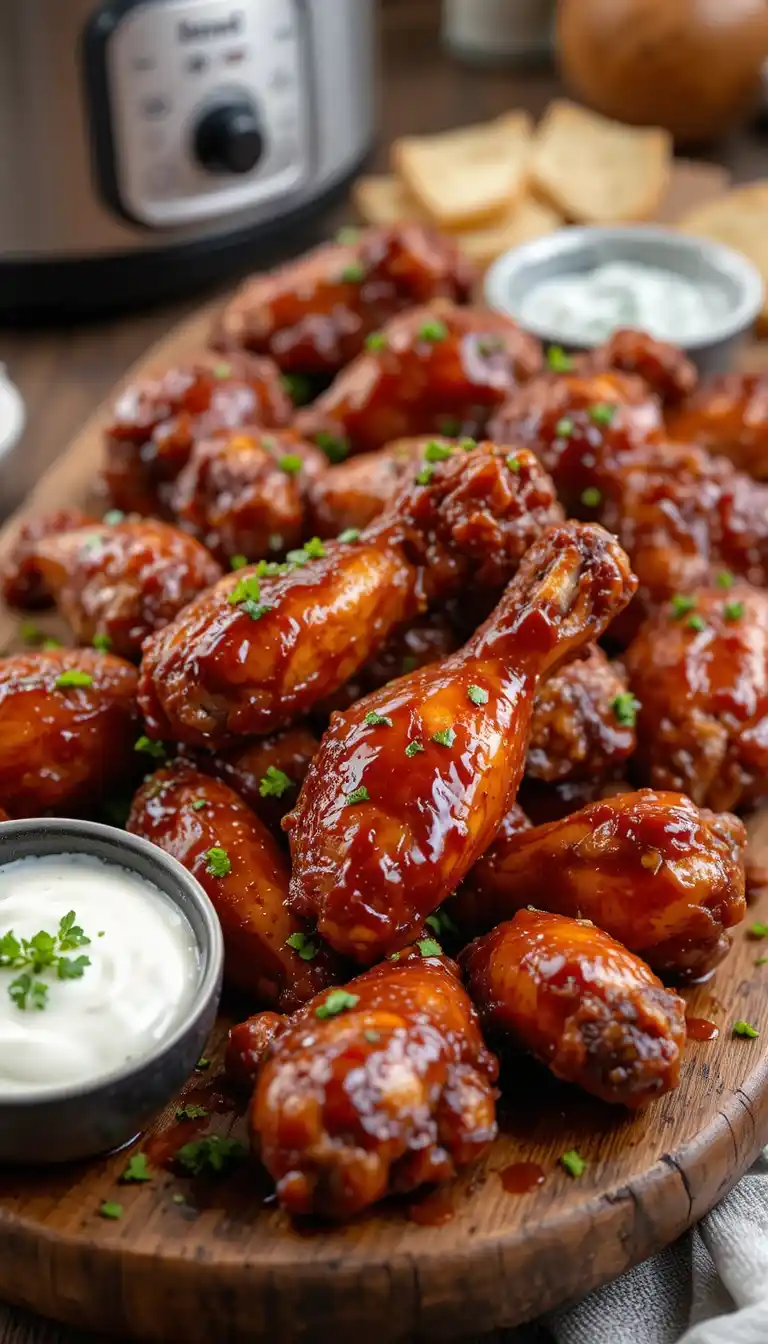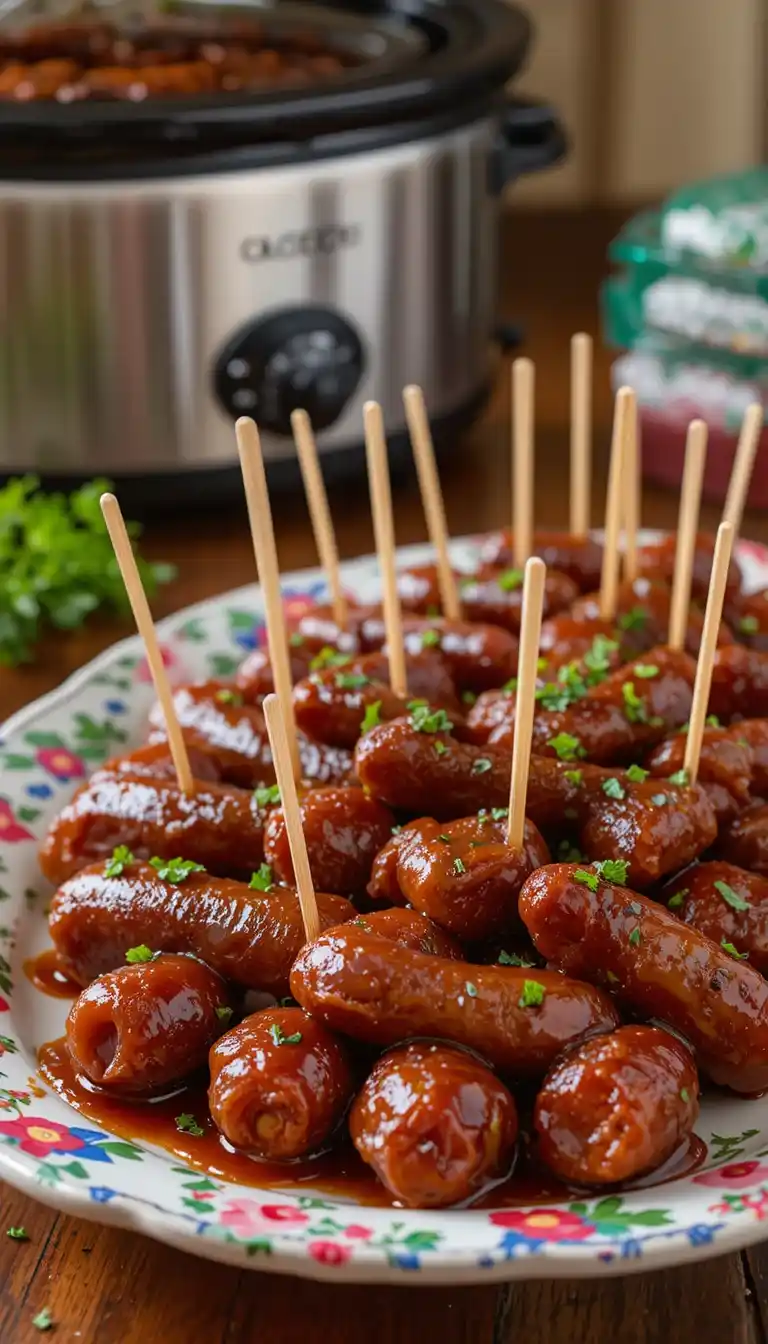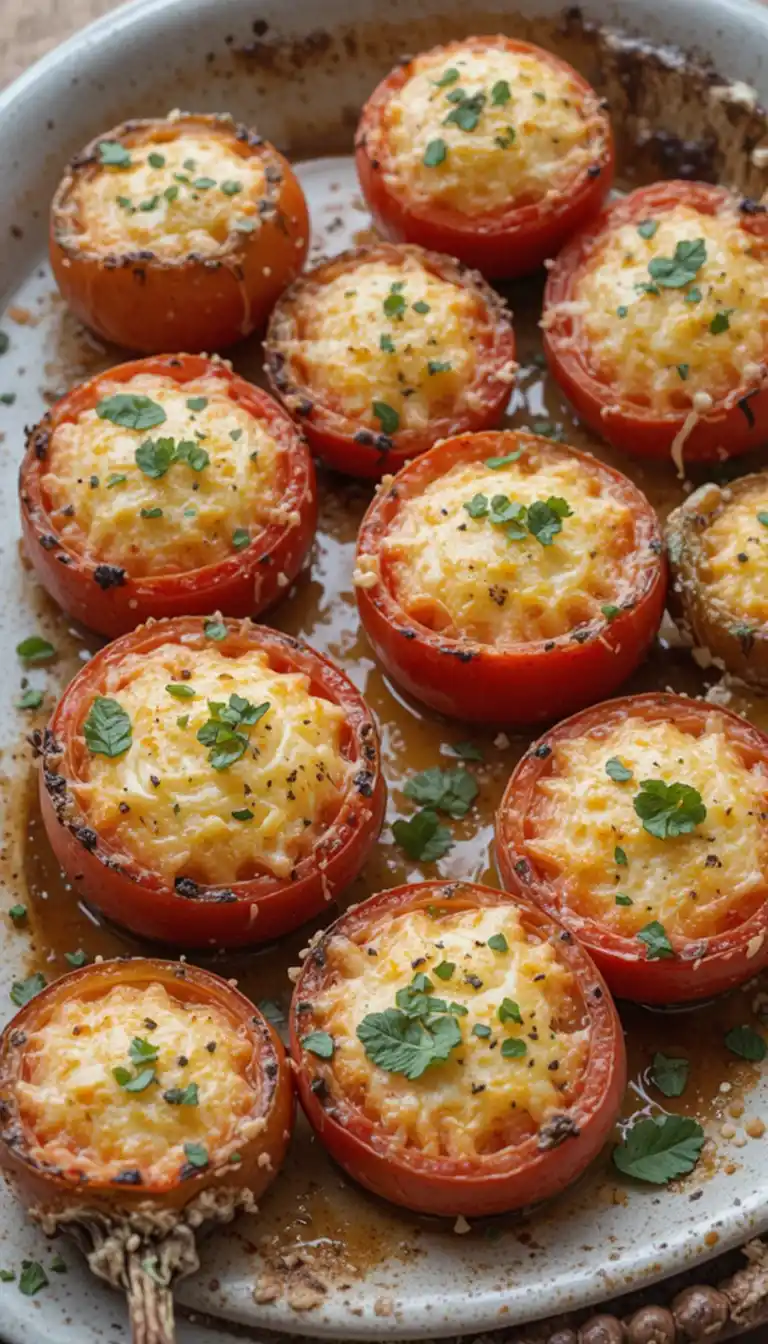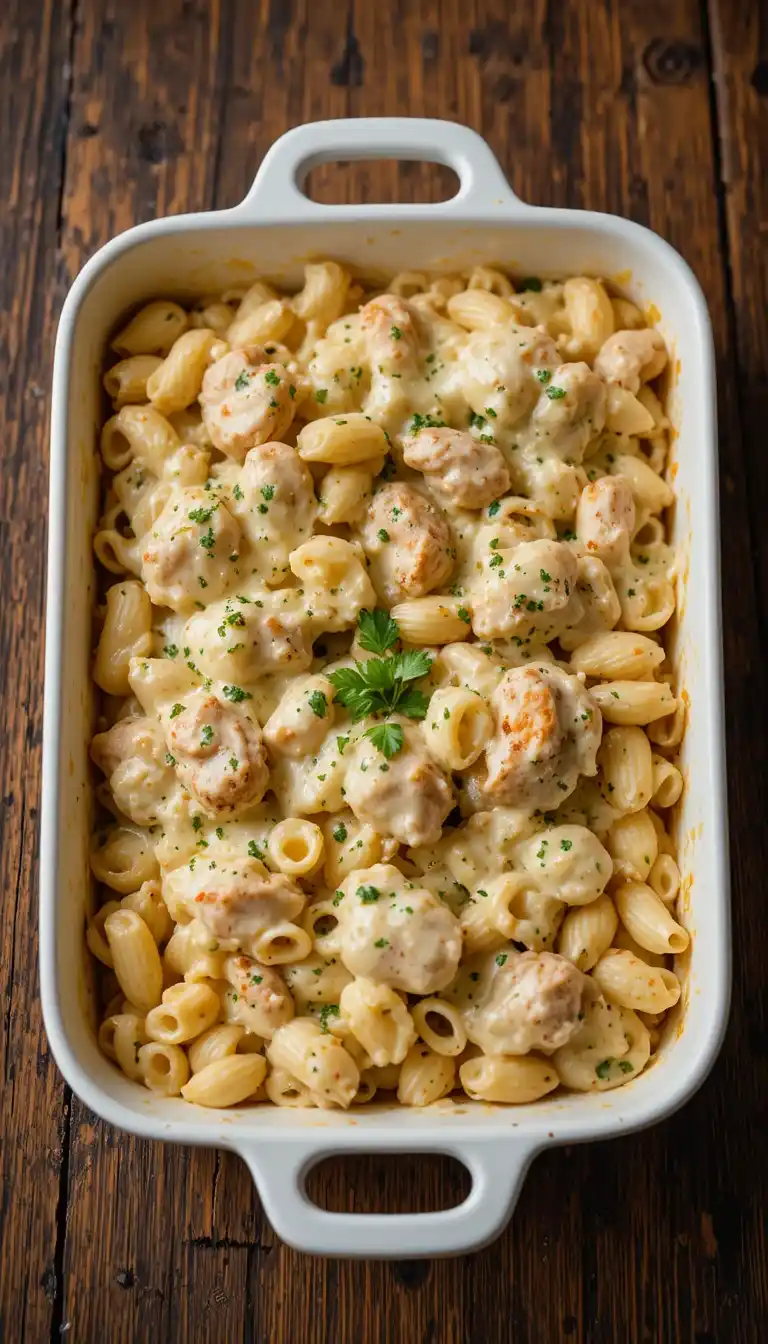Pickled Brussel Sprouts are one of those somewhat underrated greats that combine crunch, tang, and flavor explosion in every mouthful. This is the pickled brussels sprouts recipe for you if you’ve ever been on the lookout for a way to add pizzazz to your snacking or zest to your meals. Brussels sprouts, unlike pickle cucumbers, have a slightly heartier texture and a hint of nuttiness that complements a vinegar brine.
Super easy, highly custom and adaptable, this recipe has been quickly gaining popularity in home kitchens. Pickled brussels sprouts are fun on charcuterie boards, tossed with salads, or just out of the jar. They also keep well, so there will always be a jar in your pantry to impress an unsuspecting soul or quiet your cravings. In this guide, you will learn everything that you need to know about how to master brussel sprout pickling, from ingredients to storage tips.
Why Pickled Brussel Sprouts Are a Must-Try
There’s something special about pickled brussel sprouts that makes them a must-try for any food enthusiast. First of all, it is as optional as being delicious; but they are also nutritious. Brussel sprouts are rich sources of fiber and vitamin C plus antioxidants. Pickling them, goes that extra probiotic mile into gut health.
Apart from their health benefits, they pack an extraordinary punch. The tangy vinegary brine makes the earthy sprouts taste unearthly, combining sweet, sour, and spice into something refreshing yet very bold. The perfect ingredient for sandwiches, burgers, and your holiday platters. Apart from that, while the average pickled cucumber gives you almost nothing, pickled brussel sprouts are packed with a crunchier, meatier bite. Perfect for people who want more from their snacks.
Are you tired of the same old banal sides and appetizers? Well, with this recipe, you can have something fresh. Too, it’s a great way to save seasonal brussel sprouts for another exciting dish year-round while decreasing food waste.
Ingredients for Pickled Brussel Sprouts Recipe
Making pickled brussel sprouts doesn’t require anything fancy. The ingredients are likely already in your pantry, and they come together to form a simple yet flavorful brine. Here’s what you’ll need:
- Brussel sprouts – about 2 pounds, trimmed and halved
- White vinegar – 2 cups (apple cider vinegar also works)
- Water – 2 cups
- Garlic cloves – 4, smashed
- Salt – 2 tablespoons (pickling or kosher salt preferred)
- Sugar – 2 tablespoons, for balance
- Mustard seeds – 1 teaspoon
- Red pepper flakes – ½ teaspoon (optional, for heat)
- Dill – fresh sprigs for a classic pickling flavor
- Black peppercorns – 1 teaspoon
These ingredients work together to create a tangy, aromatic brine that complements the nutty taste of brussel sprouts. Adjust spice levels according to your taste—more garlic for a bolder punch, or extra chili flakes if you like heat.
Equipment Needed
To make this pickled brussel sprouts recipe at home, you don’t need advanced kitchen tools. Just a few basic items will help you achieve perfect results:
- Large pot – for boiling the brine
- Cutting board and knife – to trim and halve the sprouts
- Tongs or slotted spoon – for handling hot jars or sprouts
- Mason jars with lids – sterilized, for storing your pickled brussel sprouts
- Measuring cups and spoons – to ensure accuracy in the brine
- Large mixing bowl – for prepping the sprouts
While sterilizing jars isn’t complicated, it’s crucial for safe pickling. Simply boil your jars and lids in water for about 10 minutes before filling. This small step ensures freshness and extends storage life.
Step-by-Step Guide to Making Pickled Brussel Sprouts
Prepping the Brussel Sprouts
Start by washing the brussel sprouts thoroughly. Trim off the tough stem ends and remove any yellowed outer leaves. For best results, cut them in half—this helps the brine penetrate more evenly and reduces bitterness.
Creating the Pickling Brine
In a large pot, combine vinegar, water, salt, sugar, garlic, mustard seeds, peppercorns, and red pepper flakes. Bring the mixture to a boil, stirring until the salt and sugar fully dissolve. Once boiled, reduce the heat and let it simmer for about 5 minutes to allow the flavors to infuse.
Packing and Sealing Jars
Place fresh dill sprigs at the bottom of each sterilized mason jar. Pack in the halved brussel sprouts tightly but without crushing them. Carefully pour the hot brine over the sprouts, leaving about half an inch of headspace. Seal the jars with sterilized lids.
Storage and Resting Time
For quick pickling, refrigerate the jars and let them sit for at least 48 hours before eating. For long-term storage, use a hot water bath canning method. This allows the jars to be shelf-stable for up to a year.
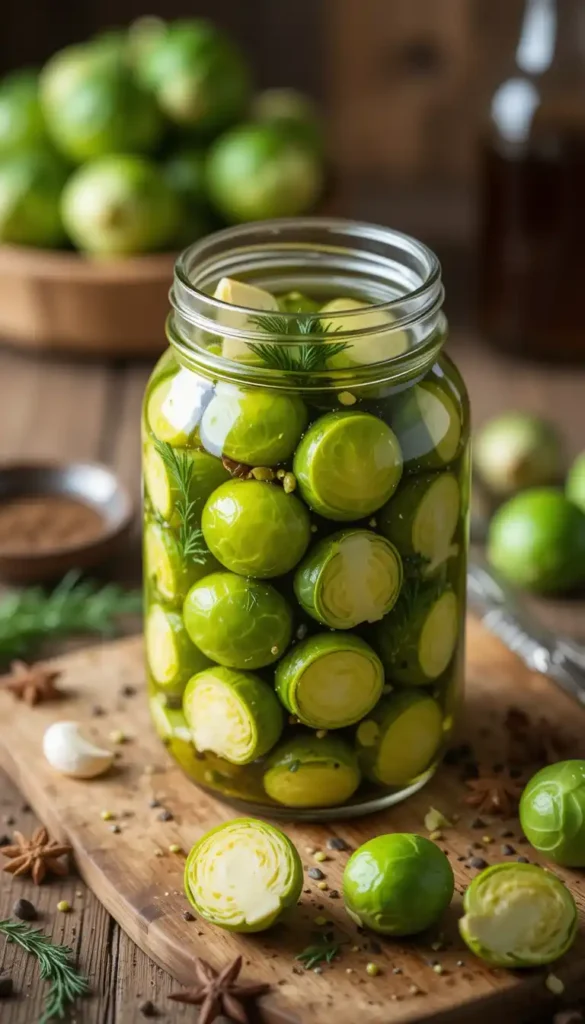
Variations of Pickled Brussel Sprouts
One of the best things about this pickled brussel sprouts recipe is how customizable it is. While the classic version is tangy and slightly garlicky, you can easily adjust the flavors to match your preferences. Here are some exciting variations:
- Spicy Kick – Add extra red pepper flakes, sliced jalapeños, or even a dash of hot sauce to the brine for sprouts with a fiery bite.
- Sweet and Tangy – Swap white vinegar for apple cider vinegar and increase the sugar slightly. This creates a milder, sweeter profile that pairs beautifully with cheese boards.
- Mediterranean Style – Add olives, oregano, and lemon zest to the brine for a fresh, herb-forward taste.
- Asian-Inspired – Infuse the brine with soy sauce, ginger slices, and sesame seeds for a savory-sweet twist.
- Garlic Lover’s Dream – Double the garlic cloves for bold, pungent flavor that garlic fans will appreciate.
Experimentation is key. The hearty texture of brussel sprouts means they hold up well to different spices, herbs, and vinegars, giving you endless opportunities to personalize each jar.
Make-Ahead and Storage Tips
Pickled brussel sprouts are perfect for making ahead of time since they actually taste better after resting. Here are a few tips to ensure long-lasting, flavorful results:
- Quick Pickling (Refrigerator Method): Store sealed jars in the refrigerator. They’ll last up to 2 months, though most people finish them long before that!
- Canning (Shelf-Stable): Use a hot water bath to process the sealed jars for 10–12 minutes. Properly canned sprouts can last up to 12 months in a cool, dark pantry.
- Best Resting Time: For maximum flavor, let the sprouts sit for at least 48 hours before opening. After one week, they’re at their absolute best.
- Storage Tips: Always keep opened jars refrigerated. Use clean utensils when removing sprouts to avoid contamination.
Making them ahead ensures you’ll always have a jar ready to serve as a side, snack, or garnish for cocktails like a Bloody Mary.
Nutrition Breakdown of Pickled Brussel Sprouts
Besides being delicious, pickled brussel sprouts are a nutritional powerhouse. Here’s what you can expect in a 1-cup serving (about 85 grams):
| Nutrient | Amount |
|---|---|
| Calories | 40–50 |
| Carbohydrates | 8–10 g |
| Protein | 3–4 g |
| Fat | <1 g |
| Fiber | 3–4 g |
| Vitamin C | 75% DV |
| Vitamin K | 80% DV |
| Folate | 15% DV |
| Sodium | Varies (depending on brine, usually 400–600 mg) |
Pickling slightly reduces vitamin C, but the sprouts still retain a significant nutrient punch. Plus, the fermentation aspect (if using a natural ferment method) can add probiotics, promoting gut health. This makes pickled brussel sprouts both a tasty and beneficial addition to your diet.
Common Mistakes to Avoid
Even though making this pickled brussel sprouts recipe is straightforward, there are a few common mistakes to watch out for:
- Skipping Sterilization: Dirty jars can lead to spoilage or unsafe pickles. Always sterilize jars before filling.
- Overcooking the Brine: Boiling too long can cause bitterness. Once the sugar and salt dissolve, a short simmer is enough.
- Not Cutting the Sprouts: Whole sprouts may stay tough and won’t absorb brine as well. Halving them ensures full flavor.
- Improper Sealing: If the jar doesn’t seal correctly during canning, it won’t be shelf-stable. Always check lids after cooling.
- Opening Too Soon: The flavor improves with time. Eating them too earlymay leave you disappointed. Patience pays off!
- Using Table Salt: Stick to pickling or kosher salt. Iodized salt can make brine cloudy and affect texture.
Avoiding these mistakes guarantees crisp, flavorful, and safe-to-eat pickled brussel sprouts every time.
FAQs
1. Can I use frozen brussel sprouts for pickling?
It’s not recommended to use frozen brussel sprouts for this recipe because freezing breaks down their firm structure, leading to soft and mushy pickles that don’t hold up well in brine. Fresh brussel sprouts give the best results, as their crunch and nutty flavor remain intact after pickling, ensuring a satisfying bite every time you open a jar.
2. How long do pickled brussel sprouts last?
If stored in the refrigerator, quick-pickled brussel sprouts last up to 2 months, while canned, shelf-stable versions can stay good for up to 12 months when sealed and processed properly. Always refrigerate after opening and use clean utensils when removing sprouts. The flavor improves over time, so waiting a week before enjoying them gives the best tangy results.
3. Do I need to sterilize jars every time?
Yes, sterilizing jars is an important step in making pickled brussel sprouts safely. Even if you’re only refrigerating your pickles, sterilizing helps prevent bacteria, mold, and spoilage. Simply boiling jars and lids for 10 minutes ensures a clean environment, giving your pickled brussel sprouts a longer shelf life while keeping them fresh, crisp, and safe for your family to enjoy.
4. What’s the best vinegar to use?
The best vinegar for pickled brussel sprouts is white vinegar because of its clean, neutral flavor that highlights the natural taste of the sprouts. Apple cider vinegar is another popular option, adding a hint of fruitiness and mild sweetness. You can also experiment with rice vinegar for a softer tang, but avoid balsamic vinegar since it’s too overpowering for delicate pickling recipes.
5. Can I make them less sour?
Yes, you can easily adjust the brine to make your pickled brussel sprouts less sour. Reduce the vinegar-to-water ratio to 3:1 and add a little more sugar for balance. This creates a milder flavor while still keeping the sprouts preserved. Using apple cider vinegar instead of white vinegar also softens the sharp tang, giving your brussel sprouts a more subtle, mellow taste.
6. Are pickled brussel sprouts healthy?
Pickled brussel sprouts are a healthy snack option, as they’re naturally low in calories, high in fiber, and rich in vitamins C and K. The pickling process retains many nutrients, and when naturally fermented, sprouts also provide probiotics that support gut health. Just be mindful of sodium levels in the brine. Overall, they’re a nutritious way to enjoy a tangy, crunchy treat.
Related Posts
https://dailytastebites.com/sweet-heat-pickles-recipe/
https://dailytastebites.com/dill-pickle-bread-recipe/
Conclusion
This pickled brussel sprouts recipe is more than just a kitchen experiment—it’s a game-changer for your snack table and meals. From their crunchy bite and zesty flavor to their impressive nutritional value, these sprouts deserve a place in your pantry. Whether you enjoy them as a side, a garnish, or a quick bite straight from the jar, they bring a unique twist that’s both practical and delightful.
If you’ve been looking for a new way to enjoy brussel sprouts, this recipe checks all the boxes: flavor-packed, easy to make, and surprisingly healthy. Don’t just take our word for it—try making a batch and taste the difference yourself.
pFor more inspiration on preserving vegetables and exploring creative recipes, check out The National Center for Home Food Preservation for trusted tips and guidelines.
Print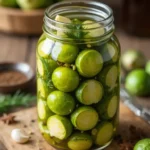
Pickled Brussel Sprouts Recipe: Crispy & Tangy
- Prep Time: 15 minutes
- Cook Time: 10 minutes
- Total Time: 25 minutes
- Yield: 3–4 pint jars 1x
- Category: Side Dish / Snack
- Method: Pickling
- Cuisine: American
- Diet: Vegetarian
Description
Crisp, tangy, and full of flavor, these pickled brussel sprouts make the perfect snack, side, or cocktail garnish. Easy to prepare and endlessly customizable!
Ingredients
- 1 lb fresh brussel sprouts, trimmed
- 2 cups white vinegar (or apple cider vinegar)
- 2 cups water
- 2–3 garlic cloves, smashed
- 1 tbsp mustard seeds
- 1 tbsp sugar
- 2 tbsp pickling salt (or kosher salt)
- 1 tsp red pepper flakes (optional)
- Fresh dill sprigs or 1 tbsp dill seeds
- Optional: peppercorns, bay leaves, onion slices
Instructions
- Trim and clean brussel sprouts. Cut large ones in half.
- Blanch sprouts in boiling water for 3–4 minutes, then transfer to an ice bath.
- In a saucepan, combine vinegar, water, salt, sugar, garlic, dill, and spices. Bring to a boil until dissolved.
- Pack cooled sprouts into sterilized jars with garlic and dill.
- Pour hot brine over sprouts, leaving ½ inch headspace.
- Seal jars, let cool, and refrigerate.
- Allow to pickle for at least 24–48 hours before enjoying.
Notes
- For spicier sprouts, add more chili flakes or jalapeños.
- Refrigerator pickles last up to 2 months. For long-term storage, process jars in a water bath.
- Best flavor develops after 1 week of pickling.
Nutrition
- Serving Size: ½ cup
- Calories: 45kcal
- Sugar: 2g
- Sodium: 320mg
- Fat: 0.5g
- Saturated Fat: 0g
- Unsaturated Fat: 0.5g
- Carbohydrates: 9g
- Fiber: 3g
- Protein: 2g

